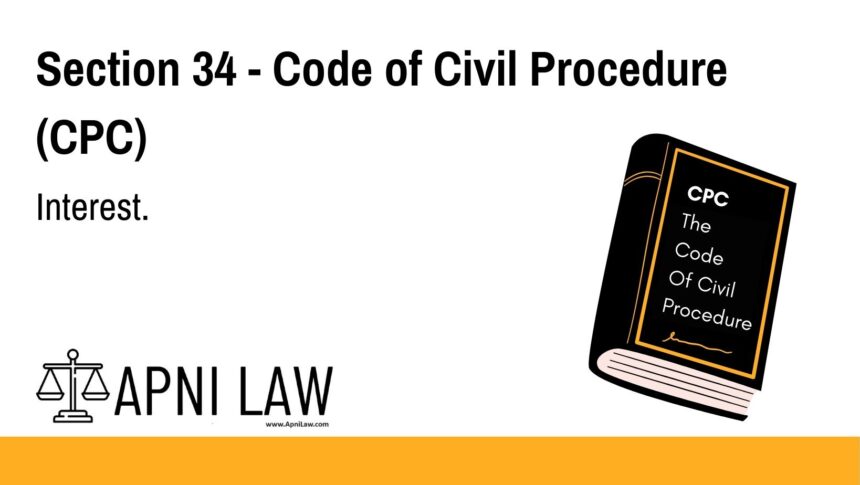Code
CPC(1) Where and in so far as a decree is for the payment of money, the Court may, in the
decree, order interest at such rate as the Court deems reasonable to be paid on the principal sum adjudged,
from the date of the suit to the date of the decree, in addition to any interest adjudged on such principal sum
for any period prior to the institution of the suit,1[with further interest at such rate not exceeding six per cent.
per annum as the Court deems reasonable on such principal sum], from the date of the decree to the date of
payment, or to such earlier date as the Court thinks fit :2[Provided that where the liability in relation to the sum so adjudged had arisen out of a commercial
transaction, the rate of such further interest may exceed six per cent. per annum, but shall not exceed the
contractual rate of interest or where there is no contractual rate, the rate at which moneys are lent or
advanced by nationalised banks in relation to commercial transactions.Explanation I.–In this Sub-section, “nationalised bank” means a corresponding new bank as defined
in the Banking Companies (Acquisition and Transfer of Undertakings) Act, 1970 (5 of 1970).Explanation II.– For the purposes of this section, a transaction is a commercial transaction, if it is
connected with the industry, trade or business of the party incurring the liability.](2) Where such a decree is silent with respect to the payment of further interest3[on such principal
sum] from the date of the decree to the date of payment or other earlier date, the Court shall be deemed to
have refused such interest, and a separate suit therefor shall not lie.
Perfect 👍 This provision is Section 34 CPC – Interest. Let’s create a well-structured, SEO-optimized article for it with explanation, illustrations, FAQs, and internal links.
Section 34 CPC: Interest
Code
Section 34 – Code of Civil Procedure
(1) Where and in so far as a decree is for the payment of money, the Court may, in the decree, order interest at such rate as the Court deems reasonable to be paid on the principal sum adjudged, from the date of the suit to the date of the decree, in addition to any interest adjudged on such principal sum for any period prior to the institution of the suit, with further interest at such rate not exceeding six per cent. per annum as the Court deems reasonable on such principal sum, from the date of the decree to the date of payment, or to such earlier date as the Court thinks fit:
Provided that where the liability in relation to the sum so adjudged had arisen out of a commercial transaction, the rate of such further interest may exceed six per cent. per annum, but shall not exceed the contractual rate of interest or, where there is no contractual rate, the rate at which moneys are lent or advanced by nationalised banks in relation to commercial transactions.
Explanation I – In this sub-section, “nationalised bank” means a corresponding new bank as defined in the Banking Companies (Acquisition and Transfer of Undertakings) Act, 1970 (5 of 1970).
Explanation II – For the purposes of this section, a transaction is a commercial transaction if it is connected with the industry, trade, or business of the party incurring the liability.
(2) Where such a decree is silent with respect to the payment of further interest on such principal sum from the date of the decree to the date of payment or other earlier date, the Court shall be deemed to have refused such interest, and a separate suit therefor shall not lie.
📖 Source: Section 34 CPC – Interest (ApniLaw)
Explanation
Section 34 CPC empowers courts to award interest in money decrees. The provision ensures fairness in monetary claims by compensating the party for delayed payments.
Key Points:
- Pre-suit Interest – Interest prior to filing the suit may be awarded if agreed by contract, usage of trade, or under law.
- Pendente Lite Interest – From the date of filing suit to the date of decree, the Court may grant reasonable interest.
- Post-Decree Interest – From the date of decree until payment, interest may be awarded not exceeding 6% per annum, except in commercial transactions, where higher interest is allowed up to:
- Contractual rate; or
- Bank lending rate (if no contract).
- If a decree is silent on post-decree interest, it is deemed refused, and no fresh suit for interest can be filed.
Illustrations
- Example 1: Non-Commercial Loan
A lends B ₹2,00,000 without commercial intent. Court awards interest @ 10% till decree but only 6% post-decree under Section 34 CPC. - Example 2: Commercial Transaction
A company fails to pay supplier bills. Court may award contractual rate of 12% post-decree, since it is a commercial transaction. - Example 3: Decree Silent on Interest
If decree does not mention post-decree interest, Section 34(2) clarifies that no further suit for interest is maintainable.
Common Questions and Answers
1. What is the maximum post-decree interest under Section 34 CPC?
Generally, 6% per annum, but in commercial transactions, it can be higher (up to the contractual rate or bank lending rate).
2. Can the Court refuse to grant post-decree interest?
Yes. If the Court does not mention it in the decree, it is deemed refused under Section 34(2).
3. What is meant by “commercial transaction” under Section 34 CPC?
A transaction related to industry, trade, or business of the party incurring liability (Explanation II).
4. Can pre-suit interest always be claimed?
Not always. It must be supported by contract, law, or mercantile usage.
5. Can a fresh suit be filed for interest if not awarded in the original decree?
No. Section 34(2) bars a separate suit for such interest.
Conclusion
Section 34 CPC provides a structured framework for awarding interest in money decrees, balancing fairness for the decree-holder with reasonable limits on liability. It differentiates between ordinary and commercial transactions, ensuring justice in both personal and business disputes.
👉 For more details, visit: Section 34 CPC – Interest (ApniLaw).








